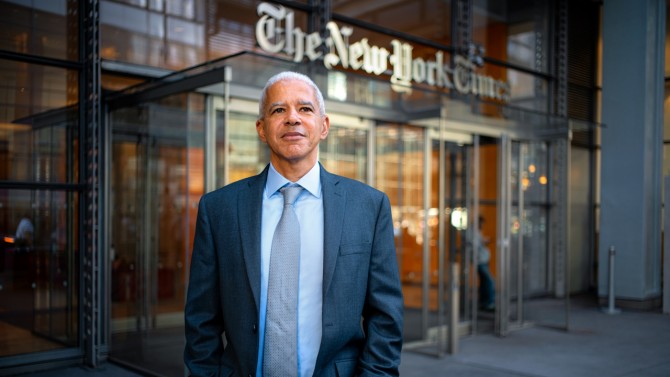NY Times editor, alum is first Distinguished Visiting Journalist
By Linda B. Glaser
Marc Lacey ’87, national editor for The New York Times, will be the inaugural fellow in the Distinguished Visiting Journalist Program, launching next semester in the College of Arts and Sciences.
The new program will bring accomplished journalists to Cornell for stays of two to eight weeks. The program is expected to bring two fellows per year to interact with faculty, researchers and students.
“Our goal is to recognize and support excellence in journalism while promoting meaningful engagement between journalists and the academy,” said Ray Jayawardhana, the Harold Tanner Dean of Arts and Sciences. “The program will give our students and faculty the opportunity to engage with eminent journalists, and offer visiting fellows the chance to deepen their understanding of emerging discoveries and frontline scholarship as they participate in the life of a leading research university.”
Lacey has spent 20 years at The New York Times, in roles including foreign correspondent, White House correspondent and editor of the weekend news report. Before arriving at The New York Times, he was a reporter for the Los Angeles Times.
He recently served as a moderator for the fourth Democratic presidential debate, held Oct. 15 in Ohio.
“This program is an acknowledgement that journalism plays an essential role in our society, in all the disciplines that Cornell explores, and that understanding journalism is part of understanding the world,” Lacey said. “The New York Times is not just covering the news. We’re often in the news, and perhaps I can leave Cornellians with some insights into what it’s like to work in such a scrutinized newsroom at this particular time.”
While a student at Cornell, Lacey served as editor-in-chief of The Cornell Daily Sun and as campus stringer for The New York Times, researching and writing for the education section. He majored in biology and society, and was selected as a member of Quill and Dagger, the honor society. He went on to receive a master’s in international policy and practice from George Washington University.
Lacey also studied at Columbia University’s Graduate School of Journalism, in the Sulzberger Executive Leadership Program. He served as a juror for the Pulitzer Prizes in 2018 and 2019 and, as a reporter, contributed to Pulitzer-winning breaking news coverage at the Los Angeles Times.
Visiting Journalist Program fellows will participate in panel discussions, make guest presentations in classes and explore research laboratories and special collections, among other activities. The fellows will engage with students interested in journalism and the media while learning about the latest research, scholarship and creative works emerging from Cornell.
The program is funded through philanthropic support, including from the Dr. Guinevere Griest Fund for Public Engagement. Griest ’44 served as editor-in-chief of The Cornell Daily Sun, and later as a senior official at the National Endowment for the Humanities for much of her career.
Selected fellows will have demonstrated an interest in fundamental research, scholarship and creative works that impact humanity, as well as in mentoring graduate and undergraduate students interested in the field of journalism and the broader media landscape.
Candidates for the prestigious fellowships will be selected by an internal committee of faculty and staff, including: Jayawardhana, also a professor of astronomy; Noliwe Rooks, professor of Africana studies and director of the American Studies Program; Steven Strogatz, the Jacob Gould Schurman Professor of Applied Mathematics; Jessica Chen Weiss, associate professor of government; and Joel Malina, vice president for university relations.
The program will include opportunities to collaborate with The Cornell Daily Sun. Lacey has remained involved with the paper since graduating, including serving on the paper’s alumni board.
“It’s a tough time to be a student journalist, as reader habits change from consuming news in print to taking it in on smartphones,” said Lacey. “The Sun is already well on its way to changing its focus to digital while continuing to serve devoted print readers. I want to help The Sun editors with this pivot and with anything else they need to produce a round-the-clock, essential, top-quality news product in these challenging times.”
Linda B. Glaser is news and media relations manager for the College of Arts and Sciences.
Media Contact
Get Cornell news delivered right to your inbox.
Subscribe

